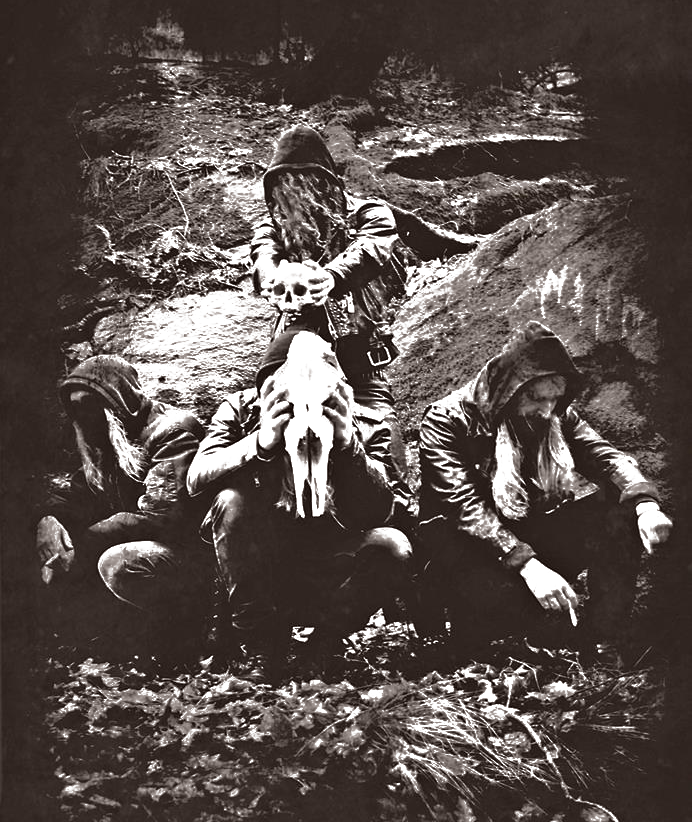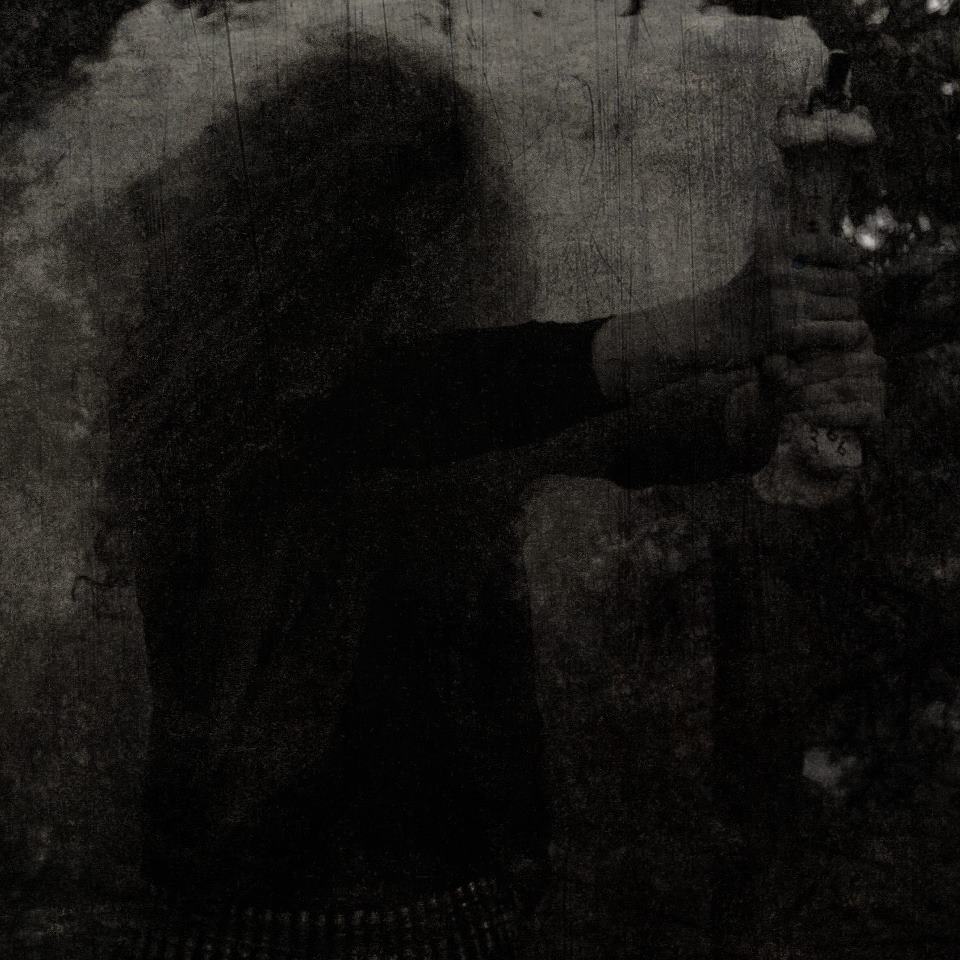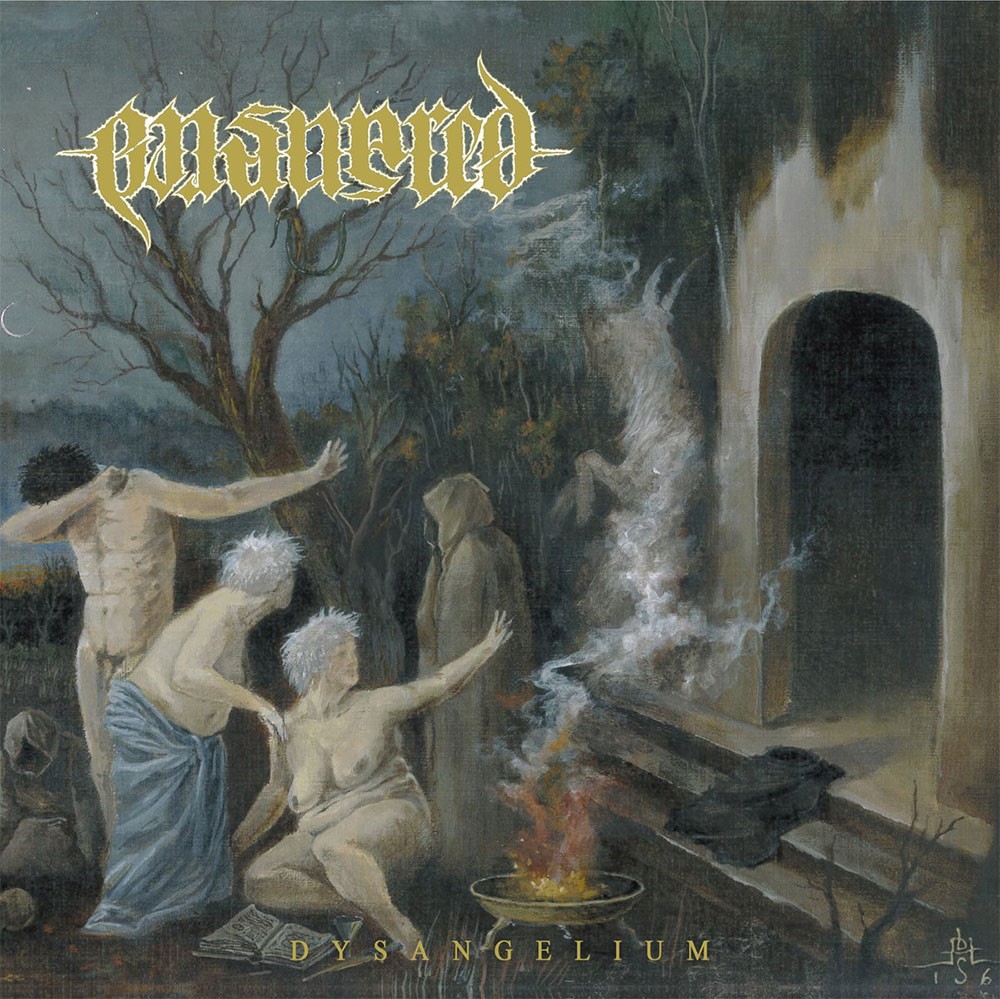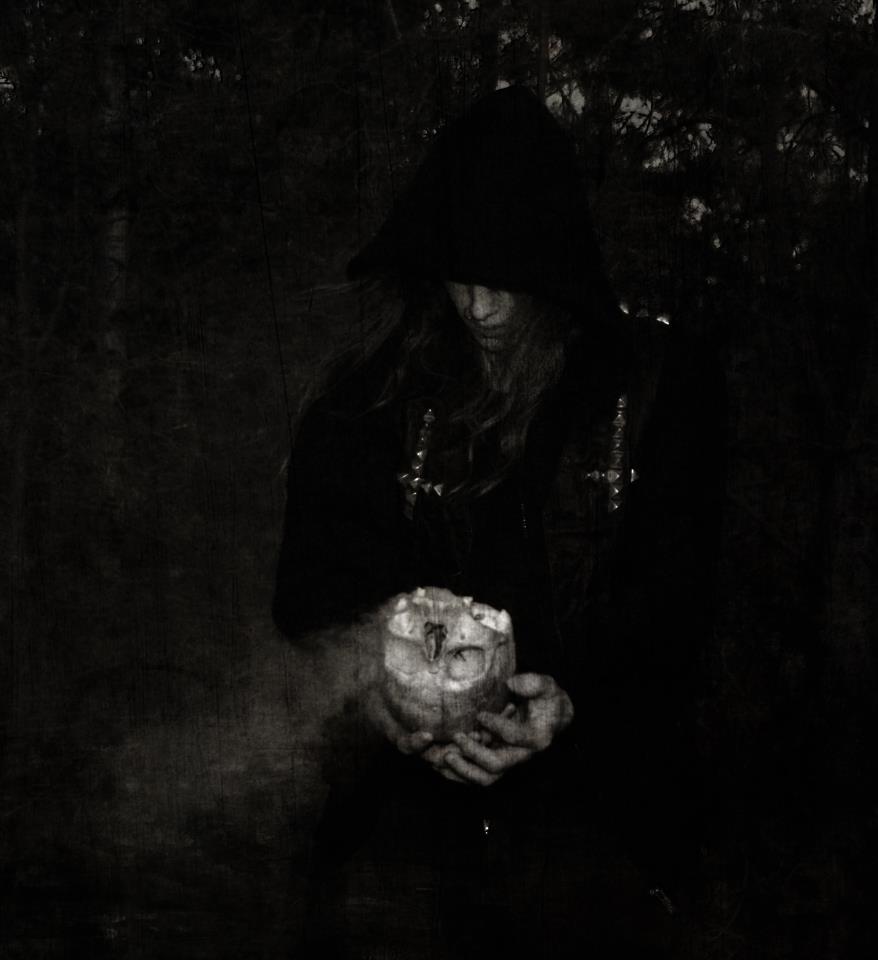Ensnared
2017-07-26
by Niklas Göransson
Bearing ominous tidings of existential futility comes Swedish death metal band Ensnared. We explore tunes of transcendence, youthful fervour, and whether to challenge the cross or crescent moon.
– “Dysangelium” took manifold shapes and forms over the years of toiling in various rehearsal places. Each song has been constructed and deconstructed, arranged and rearranged, multiple times; to the extent where we found ourselves being swept along by our compositions rather than the opposite way around. It was almost as if the emerging material had a will of its own. Some songs feel wild, uncontrolled and on the verge of breaking free – in all honesty, a better result than we’d dared hope for.
Another aspect given ample attention was the accompanying promotional photography. H.K. says they wanted their new promo shots to resemble those taken for the 2013 EP “Ravenous Damnation’s Dawn”.
– We had a lot of additional ideas but none of them could be practically implemented. Line-up photos are an integral part of any album and require more effort than four guys just casually standing around. They should be as representative of a band as their actual musical output – the same goes for layout. Everything needs to be carefully crafted, each facet should contain some manner of artistic expression.
ENSNARED’s vision was of a record without a single moment of silence – in pursuit of this, they created a number of interludes designed to weave the material together.
– We wrote some of them with specific songs in mind, while others were moulded into the record at a later point. A lot of time and effort went into the track order as we sought to forge an entirety out of parts, we felt compositional singularity would be unattainable unless the songs and interludes fit seamlessly with each other. This album was meant to be one experience.
“Dysangelium” was recorded in Gothenburg studio Black Path and produced by its proprietor, Oscar Carlquist of RAM. Entering the mixing phase, several band members held vastly diverse opinions regarding what kind of soundscape to aim for; clear and polished or filthy and raw.
– Naturally, musicians tend to have different ideas of the production depending on what instrument they play. There were a lot of discussions about what sound the interludes should have; a similar character to that of FIELDS OF THE NEPHILIM, or as if recorded by a couple of junkies in a basement.
Listening to the album, one gets the impression that those pushing for a clearer sound prevailed.
– We realised it was necessary in order to fully execute our ideas and properly convey all of the layers. Ultimately, some ended up with a slightly different production than others; “Interlude II” sounds as if it was recorded in a vast temple structure and fits perfectly with the ensuing “Antiprophet”, whereas “Interlude III” has more of a crack-den kind of vibe.

H.K. mentions in passing that the first interlude was originally a music piece he composed for meditative purposes, without any plans of using it on a record. Possessing a somewhat transcendentally inquisitive predisposition, I conclude this claim warrants further scrutiny.
– I tend to distinguish between spiritual and psychological meditation. The former is primarily geared towards deeper insights and is mostly practised within a traditional framework, usually Tantric or Qliphotic in nature. The latter has aspects of Buddhism and is a sort of self-analysis; deliberations on certain questions which have proven unanswerable, and just shutting down the brain for a while.
Given its origin, does the material have any such effects when performed?
– Some rehearsals tend to assume a trance-like atmosphere; we’ll kill all the lights and then play only interludes, allowing the music, darkness and all that lies between roam free. These sessions are typically the most inspiring and fruitful, which has in turn prompted us to consider how to further develop this idea.
H.K says they’ve discussed the possibility of some kind of ENSNARED record consisting only of these interlude-styled compositions tailored after this specific purpose.
– A few of the interludes were written in direct connection with trance states and are now listened to either before or after moments ’when the fullness of horror and that of joy coincides’. I feel as if I’ve succeeded when I can enjoy the end result of what was once written in connection with meditations while engaged in the same activity, a return to the source. On a related note; I’m also very curious about Jung and his teachings, but I’ve only just gotten started with my reading.
In the early 20th century, Swiss intellectual titan Carl Gustav Jung founded a school of psychotherapy called analytical psychology – it has since proven highly relevant for a number of fields; philosophy, theology, archaeology, anthropology and so forth. Jung is also credited with defining important psychological concepts such as the collective unconscious, archetypal phenomena, and synchronicity.
– His teachings appear to have a lot to offer since he approached psychology in such a mythological and almost religious way, implementing ancient ideas of myth and alchemy in his thinking and writing.

Leading up to this interview, H.K. announced his complete disinterest in discussing the ’old school scene’ – having been born in the nineties and thus citing a lack of empirical experience. These pages have featured several analyses of the younger metalhead breed, courtesy of various scene veterans, but ENSNARED are the first to actually belong to it.
– Often when we’ve met ’metal veterans’, they’ve questioned our dedication and have generally been highly sceptical towards us since we come from the ’internet generation’. I assume this kind of elitism has its roots in the tape-trading community, where music and merch weren’t as accessible as today. This is a natural evolution, since hardships tend to form strong bonds between people.
He says they’ve never minded being constantly challenged, nor do they take any of it personally.
– The older vanguard, those who’ve been into metal long before we were fucked into existence, have every right to question us newcomers. I believe it’s the same in any community, it should really be regarded as something akin to a rite of passage. One could argue that an intensified bullying would be fully warranted, if only to weed out the wimps.
H.K. adds that both he and drummer, J.K, his younger brother, got into metal before internet availability really exploded in the forms of Spotify, YouTube, and other streaming services.
– Much of what we wanted to listen to wasn’t actually available online. Sure, there was download software and certain blogs providing obscure metal, but a lot had to be purchased. I think both of us had bought vinyl before we ever downloaded an album. We never felt that a digital file was in any way comparable to the actual, physical record.
It’s often been said that availability lessens devotion, what do you think?
– We might not have developed the same kind of dedication as tape-traders would have, but I believe our generation requires an entirely different form of fervour. Considering not only that everything you might want to listen to is just a mouse-click away, add to that how much more content there is to navigate compared to the 90s.
H.K. points out how it demands both commitment and principles to keep buying records when virtually anything is already available for streaming or download – something even vast parts of the older generation have ceased doing.
– This might be a different kind of dedication. Ordering ten demo tapes when there’s only twenty on offer doesn’t require a great amount of fanaticism – buying ten demo tapes when there’s already a million of them available on Bandcamp does.

The album title, “Dysangelium” is a term coined by German philosopher Friedrich Nietzsche. The literary translation means ’ominous tidings’ and is an antonym to the word evangelium; the joyous message.
– The evangelium in this context obviously refers to the birth of Christ. Prior to the album, we asked ourselves questions of philosophical, religious, and I suppose one could say metaphysical nature. The spiritual concepts don’t come from one religion in particular but from many. We also incorporated two invocations and a curse, intended to explore how or if a magically charged album would work.
H.K. says the lyrics contain a lot of literary and philosophical influences and deal with matters of causality, the inanity of life, and perceived reality.
– There are also ponderings on the legitimacy of earth’s existence, and religion without solace. ’Hope’ is the most abominable word in the dictionary, and the most overrated one is ’yes’. The message of “Dysangelium” is one of futility and can in that sense be regarded as anti-Christian, since the messianic birth represents hope to man.
As a fellow Swedish resident, I’m somewhat perplexed as to why anyone in this day and age feels the need to be ’anti-Christian’. Besides the occasional Jehovah’s Witnesses and Salvation Army soldiers, it’s rare to ever detect any biblical activity in the flesh.
– Perhaps it’s a question of where you live but I personally tend to come across a lot of Christians in everyday life, and both J.K. and I were actually highly affected by Christianity during our upbringing. We also believe morality in Sweden would look a lot different if biblical values had never taken a hold here, don’t you?
Undoubtedly, though I’d wager sixty years of Social Democratic political hegemony during the 20th century shaped contemporary Swedish society somewhat more than the Lutheran legacy.
– Provoking Christianity isn’t overtly rebellious these days, but that’s not the purpose of our record. The album can just as well be deemed anti-religious in the sense that’s it’s anti-hope – and what does religions mean for the individual if not hope? We more or less sympathise with (French poet) Arthur Rimbaud when he declares morals to be a disease of the brain.
One could say there are plenty of morals in underground metal. Even the most stalwart proponents of cosmic annihilation seem to agree that ripping off fellow metalheads in trades or record purchases is decidedly beyond the borders of acceptability.
– We realise that every kind of community has its own vices and virtues. Makes you wonder if morality is an inescapable product of being human, which might just be the case.

Besides perpetuation of metal tradition, I still fail to see the relevance. Especially seeing as how the national Swedish church is, at present, acting far more ‘anti-Christian’ than any congregation wielding bullet belts and distorted guitars. For instance, in 2016 there was fierce internal dispute when a few priests had the audacity to encourage fellow believers to carry visible crosses around their neck, as a show of faith. This caused an absolute uproar among the ecclesial leadership, who denounced the notion as ‘divisive’, inflammatory’ and – I kid you not – ‘unchristian’.
– The Church of Sweden is absolutely no threat to anything besides itself. It’s not really much of a religious institution these days, rather yet another organisation competing in being as PC as possible. One could actually argue that political correctness is our new state religion, since it’s adopted almost all theological aspects besides the spiritual. The irony of Mao Zedong, a dedicated anti-religious man, coining the term ’politically correct’ is not lost on us. Provoking this new doctrine is the easiest thing you can do but that would entail having to get political and espousing sentiments we don’t really stand behind just for the sake of provocation, and that seems utterly infantile. We have no interest in this.
Now, if only there was a religion here actually asserting its presence…
– Yes, yes – I’ll bite… ENSNARED is anti-Islam in exactly the same way we’re anti-Christian, although we have more respect for the Muhammadans since they at least seem to take their religion seriously. The difficulty with this discussion is to not let it become a political matter – Islam and politics are inseparable in Sweden and we have no such aims whatsoever, nor do we really care.
So Islam is not a threat to the way of life you’d like to pursue?
– We personally don’t feel so, no – hence why there’s little need for us to bring it up in our lyrics. The Koran denies the Holy Trinity and that Jesus was the son of God, born to bring salvation to mankind – although its own perspective on hope is very obvious from the incessant rants about paradise. It takes a far stronger kind of conviction to blow yourself up along with an elementary school with the prospect of an afterlife reward than just passively praying for mankind’s redemption.
H.K. says that while suicide attacks can be deemed a religious or sacred act, it bears mentioning that these purported deeds of self-sacrifice are typically motivated in greater part by the promised acquisition of a post-mortem harem – ultimately rendering them egoistically motivated.
– It’s not very often you hear of suicide bombings carried out solely from the love of Allah, is it? Wouldn’t a real sacred act be to blow yourself up along with a hundred children without any afterlife aspirations – for the sole purpose of advancing the might of God? That’s the kind of mentality we’re looking for – this is what “Dysangelium” is all about! Destroying everything with no hopes of something new taking its place. Voids with nothing to devour begin without anything to shine upon.



